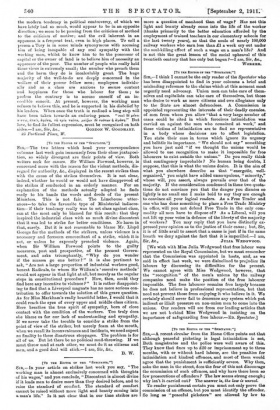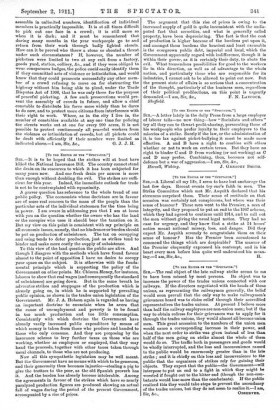[To THE EDITOR OF THE "SPECTATOR."'
Sza,—A recent circular from the Home Office points out that although peaceful picketing is legal intimidation is not, Both magistrates and the police were well aware of this. They know that fines up to £20 or imprisonment up to three months, with or without hard labour, are the penalties for intimidation and kindred offences, and most of them would agree that the punishment is sufficiently severe. Why then, asks the man in the street, does the fear of this not discourage the commission of such offences, and why have there been so few prosecutions of offenders ? The law seems strong enough; why isn't it carried out? The answer is, the law is unreal.
To render punishment certain you must not only prove the commission of an offence, but you must identify the offender. So long as "peaceful picketers" are allowed by law to assemble in unlimited numbers, identification of individual members is practically impossible. It is at all times difficult to pick out one face in a crowd ; it is still more so when it is dark; and it must be remembered that during many months in the year workpeople go to and return from their work through badly lighted streets. How can it be proved who threw a stone or shouted a threat under such circumstances P If, however, the number of picketers were limited to two at any exit from a factory, goods yard, station, colliery, &c., and if they were obliged to wear conspicuous badges, the police could easily identify them if they committed acts of violence or intimidation, and would know that they could prosecute successfully any other mem- ber of a crowd refusing to move on for obstructing the highway without him being able to plead, under the Trade Disputes Act of 1906, that he was only there for the purpose of peaceful picketing. A few such prosecutions would pre- vent the assembly of crowds in future, and allow a chief constable to distribute his force more widely than he dares to do now, and to protect more citizens from interference with their right to work. Where, as in the city I live in, the number of constables available at any one time for policing the streets works out at one for every 200 acres, it is not possible to protect continuously all peaceful workers from the violence or intimidation of crowds, but all pickets could be dealt with efficiently if their number were limited as
indicated above.-1 am, Sir, &c., G. J. J. H.







































 Previous page
Previous page